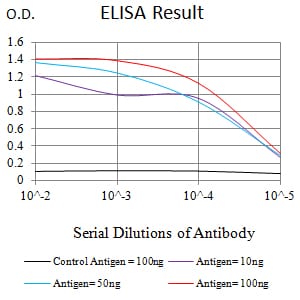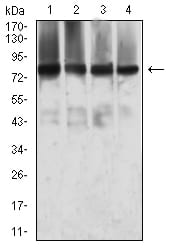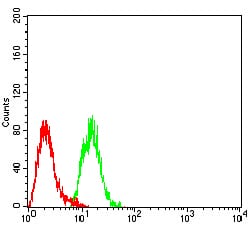


| WB | 1/500 - 1/2000 | Human,Mouse,Rat |
| IF | 咨询技术 | Human,Mouse,Rat |
| IHC | 咨询技术 | Human,Mouse,Rat |
| ICC | 技术咨询 | Human,Mouse,Rat |
| FCM | 1/200 - 1/400 | Human,Mouse,Rat |
| Elisa | 1/10000 | Human,Mouse,Rat |
| Entrez GeneID | 9112 |
| clone | 6B1E9 |
| WB Predicted band size | 80.8kDa |
| Host/Isotype | Mouse IgG2b |
| Antibody Type | Primary antibody |
| Storage | Store at 4°C short term. Aliquot and store at -20°C long term. Avoid freeze/thaw cycles. |
| Species Reactivity | Human |
| Immunogen | Purified recombinant fragment of human MTA1 (AA: 541-715) expressed in E. Coli. |
| Formulation | Purified antibody in PBS with 0.05% sodium azide |
+ +
以下是关于MTA1抗体的3篇参考文献,包含文献名称、作者及摘要内容的简要概括:
---
1. **文献名称**:*MTA1. a metastatic tumor antigen, enhances oncogenic phenotype through modification of chromatin dynamics*
**作者**:Nawa, T., et al.
**摘要**:该研究探讨了MTA1蛋白通过染色质重塑促进肿瘤转移的分子机制。研究利用特异性MTA1抗体进行免疫共沉淀(Co-IP)和染色质免疫沉淀(ChIP),证实MTA1通过调控组蛋白去乙酰化酶(HDACs)复合物,增强癌基因表达并驱动肿瘤侵袭。
2. **文献名称**:*Development of a monoclonal antibody against MTA1 for immunohistochemical analysis of breast cancer progression*
**作者**:Zhang, Y., et al.
**摘要**:研究团队开发了一种高特异性抗MTA1单克隆抗体,并通过免疫组化(IHC)分析乳腺癌组织样本。结果显示,MTA1的高表达与肿瘤分期、淋巴结转移及患者预后不良显著相关,提示其作为乳腺癌生物标志物的潜力。
3. **文献名称**:*MTA1 interacts with ERα to regulate epithelial-mesenchymal transition in triple-negative breast cancer*
**作者**:Li, D., et al.
**摘要**:本文发现MTA1与雌激素受体α(ERα)相互作用,促进三阴性乳腺癌(TNBC)的上皮-间质转化(EMT)。研究通过Western blot和免疫荧光(使用MTA1抗体)验证了MTA1-ERα复合物对下游信号通路(如TGF-β)的调控作用,为靶向MTA1的治疗策略提供依据。
---
以上文献聚焦于MTA1抗体在机制研究、诊断应用及靶点验证中的具体应用,覆盖基础与临床研究场景。如需扩展,可进一步检索PubMed或Web of Science数据库(关键词:MTA1 antibody, metastasis, cancer)。
The MTA1 (Metastasis-Associated Protein 1) antibody is a crucial tool in studying the role of the MTA1 protein, a member of the MTA family involved in chromatin remodeling and gene regulation. Discovered in the 1990s, MTA1 is a component of the NuRD (Nucleosome Remodeling and Deacetylase) complex, which modulates gene expression by altering chromatin structure through histone deacetylation. MTA1 is widely recognized for its dual role as a transcriptional corepressor and coactivator, influencing pathways linked to cancer progression, metastasis, and DNA repair. Overexpression of MTA1 correlates with aggressive tumor behavior, poor prognosis, and therapeutic resistance in various cancers, including breast, prostate, and gastrointestinal malignancies.
MTA1 antibodies are designed to detect and quantify endogenous MTA1 protein levels in experimental models. These antibodies are essential for techniques like Western blotting, immunohistochemistry (IHC), immunofluorescence (IF), and co-immunoprecipitation (Co-IP), enabling researchers to explore MTA1's subcellular localization, protein interactions, and regulatory mechanisms. Their applications extend to investigating MTA1's involvement in epithelial-mesenchymal transition (EMT), hypoxia response, and hormone signaling. Validated MTA1 antibodies are critical for distinguishing between MTA1 isoforms and understanding its post-translational modifications. As MTA1 emerges as a potential therapeutic target, its antibodies also support drug development by assessing target engagement in preclinical studies. Researchers prioritize antibodies with high specificity, sensitivity, and cross-reactivity across species to ensure reliable data in both basic and translational cancer research.
×